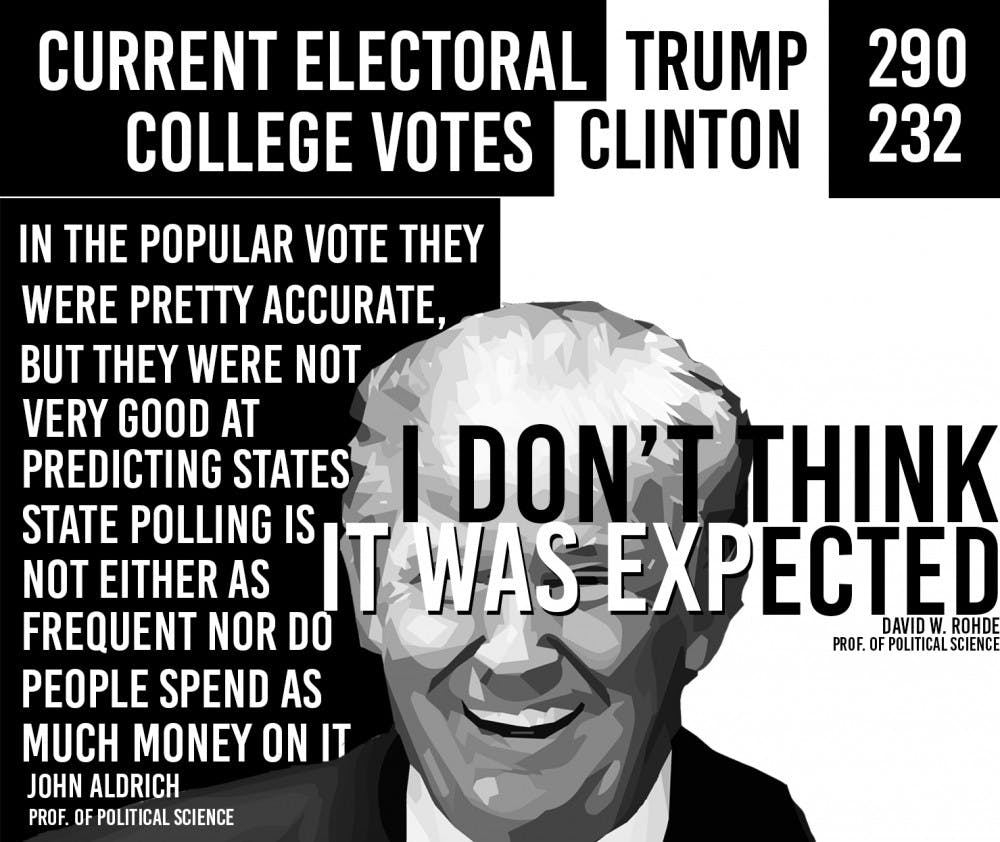Despite losing the popular vote by a wider margin than any elected president in history, Donald Trump is now the president-elect of the United States—but many are raising questions about how exactly that happened.
More than a week after the election, Trump is estimated to have secured 290 electoral college votes compared to Democratic presidential nominee Hillary Clinton’s 232 votes. Clinton, however, as of Saturday has been reported to have 1.32 million more popular votes than Trump, according to CNN. For only the fourth time in history, the popular vote is in disagreement with the electoral college.
“I don’t think it was expected,” said David Rohde, Ernestine Friedl professor of political science. “But mainly the reason it wasn’t expected was because Trump wasn’t expected to win.”
John Aldrich, Pfizer-Pratt University professor of political science, noted that if the state polling before the election had been accurate, a defeat in electoral votes would have been unlikely. The reason poll predictions largely turned out to be inaccurate, Aldrich said, comes down to an issue of cost.
“In the popular vote, they were pretty accurate, but they were not very good at predicting states—state polling is not either as frequent nor do people spend as much money on it," he said. "Since it’s really expensive to do 50 states, they tend to be much less accurate than national polls.”
In the wake of public outrage about the results, interest has been renewed in a lesser-known piece of legislation called the National Popular Vote Interstate Compact, under which state legislatures would allocate their electoral votes to the candidate who wins the national popular vote. The states currently in the compact are Hawaii, Illinois, Maryland, Massachusetts, New Jersey, Washington, Vermont, California, Rhode Island and New York, adding 165 votes out of the 270 needed for the compact to take effect.
“If the NPV compact goes into effect, its proponents will have effectively changed the presidential election procedure described in the Constitution, without the bother of obtaining a constitutional amendment," said Tara Ross, lawyer and author of "Enlightened Democracy: The Case for the Electoral College," in a recent PolitiFact article.
Daniel Brezenoff of North Carolina started a petition on Change.org for the electoral college members to go against the way their states voted when they cast their official ballots on Nov. 19, making Hillary Clinton president. It currently has more than 4.5 million signatories.
However actually switching to a popular vote system by constitutional amendment, Rohde argued, would be practically impossible.
“I think that there might be a small majority in favor of switching to a popular vote system, but because of what would have to be done, that’s not enough to engineer a change where you need two thirds of both houses of Congress and three fourths of the state legislatures," Rohde said.
Aldrich said that the electoral college system for choosing president was originally "rigged" by founding fathers for a reason that "doesn't exist anymore."
“The original intent was that they should all be faithless electors, faithless to the will of the people because they would know the candidates and be able to make a better decision,” he said.
However, Aldrich noted that the role of electors has changed in the present day.
But Clinton winning with enough electors defecting from Trump in her favor seems impossible.
“It’s just not a practical possibility,” Rohde said.
Get The Chronicle straight to your inbox
Signup for our weekly newsletter. Cancel at any time.

